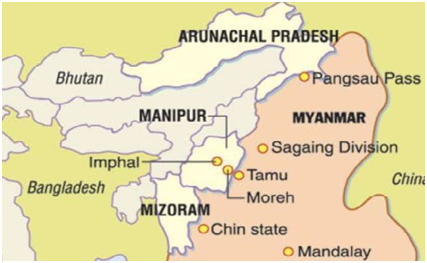

Context
Two Tamil residents of the town of Moreh in Manipur on the India-Myanmar border were found dead in Myanmar’s Tamu.
About
Tamils of Moreh:
- The Tamils of Moreh are primarily traders.
- The Tamil community became one of the most influential communities in Moreh, the border town, 110 km from the capital city of Imphal.
- The community is represented by a body called the Tamil Sangam, and it dominates a grid of lanes and timber, cement houses in the heart of Moreh.
- Sri Angalaparameshwari temple in Moreh is the second largest temple complex in the North East after Guahati’s Balaji temple.
- There is a Tamil Youth Club which organises cultural events every month and girls are trained in Bharatnatyam.
- Timithi, or the fire walking festival, is held every year between March-April.

How Tamils got settled in Manipur?
- As the 19th century saw British colonialism spread like wild fire across the world, South Asian countries became sort of inter-linked colonies.
- In the wake of the growing Raj, thousands of Indians from Tamil Nadu began to leave in search of greener pastures, and migrated to Burma (now Myanmar) attracted by the country’s growing labour prospects.
- Contrary to most military or administrative migrations from India during this time, such as to Sri Lanka or China, the Tamils in Burma were predominantly involved in rice cultivation and trade.
- They came to be known as ‘Kala Lumyo’ in Burmese land.
- As the British Empire declined in 1948, this Tamil community’s fortunes began to decline too.
- Change in power in Myanmar in 1960s:
- The Burmese Military Junta took over in the 1960s.
- Subsequently, two decisions by the then Burmese government, drastically changed things for the Indian diaspora in the country.
- The Enterprise Nationalization Law, passed by the Revolutionary Council in 1963, nationalized all major industries, including import-export trade, rice, banking, mining, teak and rubber and the Indian government was asked to withdraw its diaspora from their lands.
- In 1965, the then Indian Prime Minister Lal Bahadur Shastri sent the first batch of ships to Rangoon – from Kolkata, Chennai, Vishakapatnam and Kochi.
- A reluctant Indian diaspora, with a considerable Tamilian population, headed to a land they no longer considered home.
- The Tamilians were taken to Chennai and housed in refugee camps there and few others across the state.
- But this new life remained unpalatable to many who then decided to head back to Myanmar.
- Those who travelled by land, walked through Moreh – a route made familiar by Netaji Subhas Chandra Bose’s INA.
- The Indian diaspora became the first settlers of Moreh, along with a handful of Kuki and Meitei families that had lived there since the 1940s.


